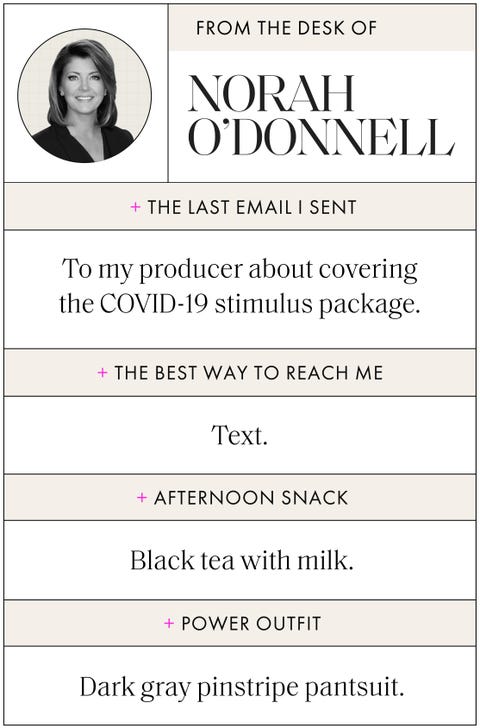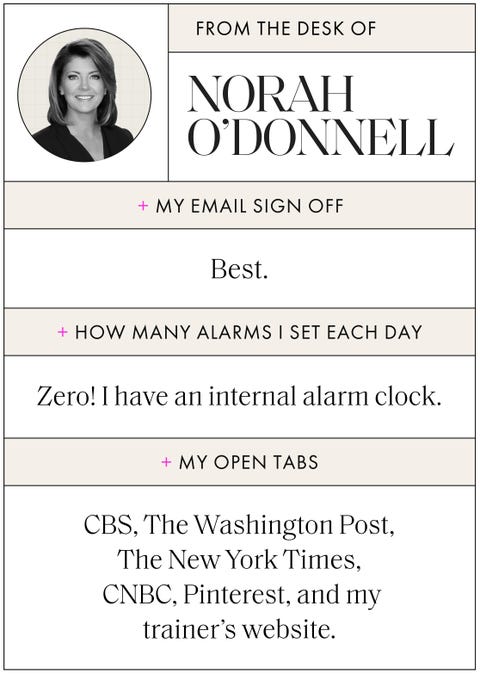In ELLE.com’s monthly series Office Hours, we ask people in powerful positions to take us through their first jobs, worst jobs, and everything in between. This month we spoke with CBS Evening News anchor Norah O’Donnell, whose year-and-a-half long investigation into sexual assault within the U.S. military uncovered systemic failures and major missteps by leadership. Below, O’Donnell on a lesson she learned the hard way, her journalism hero, and what it means to be a reporter in 2020.
My very first job
When my father was an Army doctor, we were stationed overseas in Seoul, South Korea, and my mom met someone looking for an English speaker to record language tapes for kids. I was 10 years old at the time, and I got a check every two weeks for the work. I quickly learned the power of earning an income and the freedom that provides you. My family didn’t have a lot of money growing up, so this was the first time I could go out and buy a pair of new shoes or a music tape for myself. I loved Lionel Richie and Jack Wagner, who had a brief music career. Madonna and Cyndi Lauper, too.
My hardest job
I used to babysit for $2.50 an hour growing up. Once, when I was babysitting four kids at a time, I thought to myself, “This is the hardest job in the world.” Now, as a mother, I understand why I thought that. Caring for children, keeping them entertained, fed, and cleaning up after them, as any parent or caregiver will tell you, is one of the hardest jobs in the world and it’s totally undervalued. I learned how to be patient and how to multitask, both skills I use all the time at my job today.
My journalism hero
Bob Schieffer is an incredible mentor. He has, for decades, been the most respected journalist in Washington, not only anchoring Face the Nation but also CBS Evening News. When I joined CBS as the chief White House correspondent and primary substitute on Face the Nation, Bob really put me at ease. We co-anchored together and there’s just not a better person to do that with. He would finish my sentences and I could finish his sentences. He’s a good person who embodies what it means to be a journalist. He’s also managed to maintain the trust and respect of many by not taking himself too seriously.
This content is imported from Instagram. You may be able to find the same content in another format, or you may be able to find more information, at their web site.
Words of wisdom—and the advice I ignored
The best advice I’ve ever gotten is either from my mom, who always told me, “Be a good listener,” or from longtime CBS producer Adam Verdugo, who says, “Follow your curiosity.”
The worst advice I ever got was when I first started anchoring. Someone said to me, “You’re too conversational.” I said, “Really? Tell me what that means!” They said, “You’re just too conversational.” And I said, “Well, thank you so much for that advice.” Being a good conversationalist is actually a plus in journalism. The best interviewers in the world are great conversationalists. Look at Gayle King, for example. She is an incredible conversationalist and, as a result, has the most fascinating interviews.
A lesson I learned the hard way
How to ask tough questions—without sounding judgmental. Journalists have an obligation and a responsibility to hold powerful people accountable, as well as to expose abuse and corruption. But when you ask tough questions, you have to make sure your tone is just right. One time I did a live interview with the late Sen. John McCain on a particularly heated political topic. Afterward, he called up a CBS executive and complained that my tone was off. John McCain and I had known each other forever because I covered his 2000 presidential campaign, so I saw his feedback as constructive. You can ask a tough question without it sounding like you’re annoyed or piqued by it or their response. I watch a lot of live cable television, and sometimes the tone of a reporter is what makes people think journalists are overly opinionated. There’s a way to be critical without being judgmental.
This content is imported from Instagram. You may be able to find the same content in another format, or you may be able to find more information, at their web site.
The story I’m most proud of
We have been reporting on the issue of sexual assault in the military since 2017. That ultimately became a series of Emmy award-winning reports in which we spoke to a number of cadets at the Air Force Academy who told us they been assaulted and harassed and then, in their efforts to report it, were continuously harassed. While I worked on the investigation, I kept thinking to myself that these were the future leaders of our U.S. military, the best and brightest women in the country, and they were being driven from service because of assault and harassment. It struck me not only as a great injustice to them but also a threat to our long-term national security, because we need more women serving in military affairs.
This content is imported from YouTube. You may be able to find the same content in another format, or you may be able to find more information, at their web site.
How I report on sexual assault
Digging, digging, digging, and then talking to survivors. Our work hinges on gathering people who are willing to speak on camera and describe the prevalence of sexual assault and harassment. One of the most difficult parts of investigating military sexual assault was speaking to parents with daughters who have died by suicide because of what they went through.
This content is imported from Instagram. You may be able to find the same content in another format, or you may be able to find more information, at their web site.
Why a #MeToo reckoning in the military is long overdue
Our CBS investigation preceded the Vanessa Guillén murder at Fort Hood, but her case brought so much attention, once again, to the issue of sexual harassment and assault in the military. Journalism has served a purpose here, which is pushing leaders and powerful people to make change and attempt to make change.
Many survivors and victim advocates have told me they believe it’s time for a #MeToo movement in the military. I’m from a military family, and my sister served in the military. The alleged abuse that has happened is not in line with the values I grew up knowing. There are a number of individuals carrying out these attacks, and they should be held accountable. My biggest concern is that it’s preventing really fantastic people from serving—and we need those people in order to be the best military in the world.
This interview has been lightly edited and condensed for clarity.
This content is created and maintained by a third party, and imported onto this page to help users provide their email addresses. You may be able to find more information about this and similar content at piano.io


